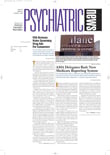It's not often that employers, clinicians, health plan executives, and government officials can unite around a common agenda, especially one as complex as the mental health component of disability, but APA won a major victory recently in its effort to engage the purchasers of health care.
On October 18-19, 30 leaders from the corporate world, public sector, and medical arena met in Chicago for a “consensus workshop” on disability and return-to-work issues. In a day and a half, attendees crafted a mission statement, produced an action plan, and formed a steering committee to carry out the plan.
On behalf of APA, the Partnership for Workplace Mental Health (a program of the American Psychiatric Foundation) hosted the conference. APA participated as a primary stakeholder with representatives from the Committee on APA/Business Relations and the Corresponding Committee on Psychiatry in the Workplace attending. Other participants included leaders from DuPont, Coca Cola, Reed Elsevier, Aetna Behavioral Health, Aetna Disability Services, Cyberonics, United Behavioral Health, Aon Workforce Strategies, AstraZeneca, UnumProvident, Midwest Business Group on Health, and Mid-America Coalition on Health, Tufts–New England Medical Center.
In addition, Martin Gerry, deputy commissioner for disability and income security programs at the Social Security Administration, represented that agency, a major stakeholder often overlooked in conversations about disability.
APA President Steven Sharfstein, M.D., spoke to the participants by phone. He emphasized that not being able to work is a mental health, as well as an economic, issue. “We firmly believe,” he said, “that APA can be part of solving mental health problems in the workplace if we listen to and talk with the payer community. We need to put our heads together to keep people at work and to bring them back to work.” He assured participants,“ We're in this for the long run.”
Representing the Business Relations Committee, Stephen Heidel, M.D., expanded on that notion, saying, “The problems of mental health disability and their solutions are bigger than any one of us can address. It will take all of us to solve them.”
Before the conference, participants completed a questionnaire about what they thought were the key problems concerning mental health disabilities. They listed a need for more mental health information; more data; more training for the treatment team on how to return employees to work successfully; more creative thinking by corporations, perhaps using incremental or transitional strategies; and improved coordination among the stakeholders. More than one person said, “Leaving work should be considered a medical emergency.”
During the meeting, participants agreed to the following mission statement:
All stakeholders are integrated and aligned in the idea that work is central to a person's identity and social role. These stakeholders (employee and family, employer, practitioner, benefit plan, government, and union) must work together to maximize productivity by minimizing the incidence and duration of mental health presenteeism, absenteeism, and disabilities.
Debra Lerner, M.S., Ph.D., an associate professor and senior scientist at the Institute for Clinical Research and Health Policy Studies at Tufts-New England Medical Center, opened the meeting by painting a costly picture of depression in the workplace. She noted that half of those with depression are undiagnosed, and fewer than half who are diagnosed with depression receive adequate treatment. She pointed out as well that depression accounts for $26.1 billion each year in direct medical costs and up to $51.5 billion (in 2003 dollars) in lost productivity.
Lerner then reviewed the findings of her team's research on the impact of depression in the workplace. She and others reported in the December 2004 Psychiatric Services that they found a high level of function loss in employees with depression. For example:
•
During a six-month period, 14 percent of individuals in the dysthymia group and 12 percent of those in the major depression group became unemployed compared with 3 percent for people with rheumatoid arthritis and just 2 percent in the control group.
•
Of those participants who were still employed at six months, those with depression had significantly more job turnover, presenteeism, and absenteeism. For example, those with depression had trouble with time management 33 percent of the time compared with 17 percent for those with rheumatoid arthritis and 7 percent in the control group. Those with depression had trouble handling their workload 35 percent of the time compared with 13 percent for those with rheumatoid arthritis and 6 percent in the control group.
Lerner proposed a research and action agenda that included developing accurate, consistent methods for measuring work disabilities and assessing the population at risk of developing them. Kenneth Mitchell, M.S., Ph.D., of UnumProvident voiced what many in the room were thinking: employers want to know “what interventions work” and “what's our return on investment?” “We have to be able to measure successes,” he emphasized.
The return-to-work problem becomes even more acute at the federal level. When disabled employees become eligible for Social Security benefits, the Social Security Administration picks up the tab. The statistics are grim: Gerry told attendees that only .2 percent of their employees ever return to work. “We are open to new ideas,” he said.
“We got the buy-in from the employers and health plans—and now the federal government—that we were looking for,” said Irvin (Sam) Muszynski, J.D., director of the Office of Healthcare Systems and Financing.“ We are ready to take this to the next level.”
Clare Miller, director of the workplace partnership, saw the buy-in as an important first step in tackling disability. “Each step taken seems to bring a larger number of stakeholders to the table who are willing to work with us,” she said. Her staff and Ed Muldoon, consultant to APA on disability issues and the conference leader, are gathering comments from the participants to finalize the action plan. ▪

